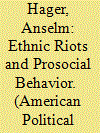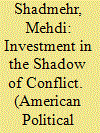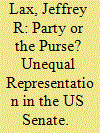|
|
|
Sort Order |
|
|
|
Items / Page
|
|
|
|
|
|
|
| Srl | Item |
| 1 |
ID:
168536


|
|
|
|
|
| Summary/Abstract |
Violent protests are dramatic political events, yet we know little about the effect of these events on political behavior. While scholars typically treat violent protests as deliberate acts undertaken in pursuit of specific goals, due to a lack of appropriate data and difficulty in causal identification, there is scant evidence of whether riots can actually increase support for these goals. Using geocoded data, we analyze measures of policy support before and after the 1992 Los Angeles riot—one of the most high-profile events of political violence in recent American history—that occurred just prior to an election. Contrary to some expectations from the academic literature and the popular press, we find that the riot caused a marked liberal shift in policy support at the polls. Investigating the sources of this shift, we find that it was likely the result of increased mobilization of both African American and white voters. Remarkably, this mobilization endures over a decade later.
|
|
|
|
|
|
|
|
|
|
|
|
|
|
|
|
| 2 |
ID:
168533


|
|
|
|
|
| Summary/Abstract |
Leveraging novel experimental designs and 2,160 months of Constituency Development Fund (CDF) spending by legislators in Ghana, I examine whether and how fairer elections promote democratic responsiveness. The results show that incumbents elected from constituencies that were randomly assigned to intensive election-day monitoring during Ghana’s 2012 election spent 19 percentage points more of their CDFs during their terms in office compared with those elected from constituencies with fewer monitors. Legislators from all types of constituencies are equally present in parliament, suggesting that high levels of monitoring do not cause politicians to substitute constituency service for parliamentary work. Tests of causal mechanisms provide suggestive evidence that fairer elections motivate high performance through incumbents’ expectations of electoral sanction and not the selection of better candidates. The article provides causal evidence of the impact of election integrity on democratic accountability.
|
|
|
|
|
|
|
|
|
|
|
|
|
|
|
|
| 3 |
ID:
168537


|
|
|
|
|
| Summary/Abstract |
Do ethnic riots affect prosocial behavior? A common view among scholars of ethnic violence is that riots increase cooperation within the warring groups, while cooperation across groups is reduced. We revisit this hypothesis by studying the aftermath of the 2010 Osh riot in Kyrgyzstan, which saw Kyrgyz from outside the city kill over 400 Uzbeks. We implement a representative survey, which includes unobtrusive experimental measures of prosocial behavior. Our causal identification strategy exploits variation in the distance of neighborhoods to armored military vehicles, which were instrumental in orchestrating the riot. We find that victimized neighborhoods show substantially lower levels of prosocial behavior. Importantly, we demonstrate that the reduction is similarly stark both within and across groups. Using qualitative interviews, we parse out two mechanisms that help explain the surprising reduction in ingroup prosociality: Victimized Uzbeks felt abandoned by their coethnics, and variation in victimization created a feeling of suspicion.
|
|
|
|
|
|
|
|
|
|
|
|
|
|
|
|
| 4 |
ID:
168535


|
|
|
|
|
| Summary/Abstract |
In conflict-prone societies, the fear of expropriation that accompanies a regime change reduces capital investment. These reductions in investments, in turn, harm the economy, amplifying the likelihood of regime change. This article studies the implications of these feedback channels on the interactions between globalization, capital control, state repression, and regime change. I show that processes that facilitate capital movements (e.g., globalization, economic modernization, and technologies that reduce transportation costs) amplify the likelihood of regime change in conflict-prone societies and strengthen the elite’s demand for a strong coercive state. In particular, to limit their collective action problem and manage the political risk of regime change, capitalists support a state that imposes capital control. We identify two conflicting forces, the Boix Effect and the Marx Effect, which determine when capital control and state repression become complements (Nazi Germany) or substitutes (Latin American military regimes) in right-wing regimes.
|
|
|
|
|
|
|
|
|
|
|
|
|
|
|
|
| 5 |
ID:
168538


|
|
|
|
|
| Summary/Abstract |
This paper proposes a novel theoretical framework to study the features of mass purges in authoritarian regimes. We contend that mass purges are an instrument of top-down accountability meant to motivate and screen a multitude of agents (e.g., single-party members, state bureaucrats). We show that the set of purged agents is well delineated in mild purges, whereas no performance indicator is a guarantee of safety in violent purges. The proportion of purged agents is non-monotonic in the intensity of violence. For the autocrat, increasing the intensity of violence always raises performance, but it improves the selection of subordinates only if violence is low to begin with. Hence, even absent de jure checks, the autocrat is de facto constrained by her subordinates’ strategic behavior. We use historical (including the Soviet purges and the Cultural Revolution) and recent (the Erdogan purge) events to illustrate our key theoretical findings.
|
|
|
|
|
|
|
|
|
|
|
|
|
|
|
|
| 6 |
ID:
168531


|
|
|
|
|
| Summary/Abstract |
Recent work on US policymaking argues that responsiveness to public opinion is distorted by money, in that the preferences of the rich matter much more than those of lower-income Americans. A second distortion—partisan biases in responsiveness—has been less well studied and is often ignored or downplayed in the literature on affluent influence. We are the first to evaluate, in tandem, these two potential distortions in representation. We do so using 49 Senate roll-call votes from 2001 to 2015. We find that affluent influence is overstated and itself contingent on partisanship—party trumps the purse when senators have to take sides. The poor get what they want more often from Democrats. The rich get what they want more often from Republicans, but only if Republican constituents side with the rich. Thus, partisanship induces, shapes, and constrains affluent influence.
|
|
|
|
|
|
|
|
|
|
|
|
|
|
|
|
| 7 |
ID:
168530


|
|
|
|
|
| Summary/Abstract |
Does media choice cause polarization, or merely reflect it? We investigate a critical aspect of this puzzle: How partisan media contribute to attitude polarization among different groups of media consumers. We implement a new experimental design, called the Preference-Incorporating Choice and Assignment (PICA) design, that incorporates both free choice and forced exposure. We estimate jointly the degree of polarization caused by selective exposure and the persuasive effect of partisan media. Our design also enables us to conduct sensitivity analyses accounting for discrepancies between stated preferences and actual choice, a potential source of bias ignored in previous studies using similar designs. We find that partisan media can polarize both its regular consumers and inadvertent audiences who would otherwise not consume it, but ideologically opposing media potentially also can ameliorate the existing polarization between consumers. Taken together, these results deepen our understanding of when and how media polarize individuals.
|
|
|
|
|
|
|
|
|
|
|
|
|
|
|
|
| 8 |
ID:
168532


|
|
|
|
|
| Summary/Abstract |
Although audio archives are available for a number of political institutions, the data they provide receive scant attention from researchers. Yet, audio data offer important insights, including information about speakers’ emotional states. Using one of the largest collections of natural audio ever compiled—74,158 Congressional floor speeches—we introduce a novel measure of legislators’ emotional intensity: small changes in vocal pitch that are difficult for speakers to control. Applying our measure to MCs’ floor speeches about women, we show that female MCs speak with greater emotional intensity when talking about women as compared with both their male colleagues and their speech on other topics. Our two supplementary analyses suggest that increased vocal pitch is consistent with legislators’ broader issue commitments, and that emotionally intense speech may affect other lawmakers’ behavior. More generally, by demonstrating the utility of audio-as-data approaches, our work highlights a new way of studying political speech.
|
|
|
|
|
|
|
|
|
|
|
|
|
|
|
|
| 9 |
ID:
168529


|
|
|
|
|
| Summary/Abstract |
Are legislators responsive to the priorities of the public? Research demonstrates a strong correspondence between the issues about which the public cares and the issues addressed by politicians, but conclusive evidence about who leads whom in setting the political agenda has yet to be uncovered. We answer this question with fine-grained temporal analyses of Twitter messages by legislators and the public during the 113th US Congress. After employing an unsupervised method that classifies tweets sent by legislators and citizens into topics, we use vector autoregression models to explore whose priorities more strongly predict the relationship between citizens and politicians. We find that legislators are more likely to follow, than to lead, discussion of public issues, results that hold even after controlling for the agenda-setting effects of the media. We also find, however, that legislators are more likely to be responsive to their supporters than to the general public.
|
|
|
|
|
|
|
|
|
|
|
|
|
|
|
|
| 10 |
ID:
168534


|
|
|
|
|
| Summary/Abstract |
Recent work on counter-insurgency, client states, foreign aid, and proxy wars uses a principal–agent framework to study the principal’s ability to induce an agent to exert effort on the principal’s behalf. This work broadly emphasizes the moral hazard problem and the actors’ limited commitment power. The latter is usually addressed through the logic of repeated games in which reneging on an agreement triggers future punishment. This study analyzes a related incentive problem that undermines the principal’s ability to induce an agent to exert effort on its behalf. The repeated-game’s enforcement mechanism tends to break down if the principal is trying to get the agent to resolve a problem that, if resolved, (i) creates an ongoing problem for the agent and (ii) simultaneously significantly reduces the agent’s ability to impose future costs on the principal. The principal cannot induce the agent to exert much effort in these circumstances, and the problem persists.
|
|
|
|
|
|
|
|
|
|
|
|
|
|
|
|
|
|
|
|
|